Ivana Keser
Author's Newspaper: The Freedom of Misinformation
The world of communication consists of slogans with a special purpose. Even this text of mine is merely an endless slogan. Aside from the question how to persuade other people, it might be currently more important to question how do other people try to persuade us. Every day other people decide what can be presented in the news, and we are in charge of separating truths form untruths, fact from fiction. Formerly, the most urgent world-wide social slogans appealed to freedom, today they appeal to security. Security means certainty, but not necessary freedom. An important factor of universal security (i.e. certainty) should be freedom. This is why my work predominantly deals with the issue of the freedom of information.
Propaganda, which
I understand as every word dispatched to the audience, is devised to provoke
a response without any thought. I call these reflex responses ready-made
answers, because they emerge from automatism, not only under the influence
of the community in which we live, but also under the influence of every
picture, message or word we have ever encountered.
Today the entire field of visual communication resembles the news. Numerous
things are made to look like news and act like news. Advertisements resemble
exaggerated news. However, they may or may not represent news. For instance,
towns, with the surfaces at their disposal present ideological surfaces.
Various surfaces have their price and they are increasingly narrowing
the notion and space of public property. Even the sky and the pavements
are bearers of messages. The view and landscape are continuously transformed
into private property intended for sale. This fundamental privatisation
of our views is called visual pollution.
Surrounded by the message and ideology inflation, our negative thinking
is often not our line of thought. It is merely a guided consequence. One
could say that we have been trained so well to think about the foreseeable
world in a certain way, that we no longer notice how well we have been
trained.
Finally, everyone who presents something to the public, with or without
a conscience, is engaged in manipulation. There is a decreasing number
of answers to the frequent question 'Can we democratise information?'
However, there is an increase in the number of proofs that it is possible
to democratise manipulation.
The Exhibition of Local Issues
The broader title
of my project 'Exhibition of Local Newspapers' consists of two parts:
the author's newspaper and the intervention within an existing newspaper
in a town or country. Both parts set up exhibitions that deal with local
problems.
I have chosen the form of printed media in order to report from the public,
collaborative and personal wanderings from one important local problem
to another. My use of the term 'newspaper' does not mark the aesthetics
of the media or the number of pages, but the space in which an idea is
found as well as the concentration of the activity. The newspaper represents
the ultimate vision of the local situation within a certain country, region
or city. This is because the view of the world is always local, regardless
of the centre of power; the global view takes place only as a consequence
of power. As viewed from the language of slogans that represent the communication
today, I think that one can often say more with one page in a newspaper
than with an entire exhibition.
I have divided the
topics that I deal with within the author's newspaper into a number of
various issues:
- the issue of the local and global
LOCAL-GLOBAL, (Rotterdam, 1996) and LOCAL NEWSPAPER, (Cleveland, 1997)
- the issue of the private and public
NOTHING PERSONAL and PRIVATE COPY, (Umag and Zagreb, 1997)
- the issue of a private utopia
LUCK IS A MUTATION WITH FOUR LEAVES, (Zagreb, 1994)
PARADISE (Graz,1996), PRIVATE UTOPIA (Barcelona, 2000)
WEEKEND ART NEWSPAPER (Stockholm, 1999) and GARDEN MIRROR (Luxembourg,
2001)
- the issue of urban frustration
FRUSTRATIONS & OBSESSIONS, (Vienna, 1999) and FRENETIC, (Vienna, 2000),
- the issue of migration and identity
STRANGERS IN THE CITY (Celje, 2000), and MIGRANTS, (Zagreb, 2001 - 2002)
The context and the time in which they appear are inseparable from my works. However, my understanding of the local context does not have to be the same as the geographical notion of the local. All of the recent world decisions that have a global character are in their basis still local. This sounds fabulous until we realise that the unique common problems that are shared by all of us are not approached globally. Some of the world problems are more global then others: global warming, corporate fascism, planned and selective genetic technology terrorism are of a lesser danger and can wait in comparison, for example, to the problem of political terrorism. This means that in order to enjoy the opportunity of ranking 'global' problems according to their importance and to act locally with a broader impact, you should be as close as possible to the centre of power. The closer you are to the centre of power the greater chance you have to present your local problem (ideology) as a global one to the rest of the world. In this sense, the state political issues always have priority over the civilian political ones. National security always has the priority over civil security and so on.
On Information
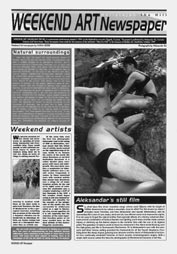 All existing
societies are societies of information and misinformation. Misinformation
is not an abstract notion of the public, for it starts between you
and me - here and now. It is possible for anyone to be a source of
information and every piece of information is already an interpretation
in itself. Therefore the truth is an interpretation. We can go to
extremes and say that today nobody is the author of his or her words,
because all words have already been used somewhere before. Examined
through the indisputable impact of the media, the hackneyed phrase
'Does the media create time or does time create the media?' remains
equally intriguing. The quantity of information nurtures us with the
illusion that we have never been closer to the truth. We were never
closer, yet we were never so slow. It seams that we have an approach
to everything, and yet we can control nothing. The media is interested
only in what can be put through to mass hysteria. It the event that
there are no news, they have to be produced.
All existing
societies are societies of information and misinformation. Misinformation
is not an abstract notion of the public, for it starts between you
and me - here and now. It is possible for anyone to be a source of
information and every piece of information is already an interpretation
in itself. Therefore the truth is an interpretation. We can go to
extremes and say that today nobody is the author of his or her words,
because all words have already been used somewhere before. Examined
through the indisputable impact of the media, the hackneyed phrase
'Does the media create time or does time create the media?' remains
equally intriguing. The quantity of information nurtures us with the
illusion that we have never been closer to the truth. We were never
closer, yet we were never so slow. It seams that we have an approach
to everything, and yet we can control nothing. The media is interested
only in what can be put through to mass hysteria. It the event that
there are no news, they have to be produced.
Have you noticed the following with newspapers: the thinner they get, the bigger the headlines. The football game on Sunday could be funny, but if our happiness depends on the way 'our' favourite team played, then we are faced with a serious local problem. Beside for profits, the media constantly works in order to promote idolatry, i.e. infatuation with stars and heroes. They try their best to do this even in an environment where there is a ridiculously small amount of consumers that would be interested in the state of the healthy show business. In the past, was the world a better place to live in? The answer is 'no'. The only difference is that today everything is transmitted through the various forms of media. Today, the news represents a constant search for the superficial excess. Communication has transformed into a hard industry, a guaranteed profit, i.e. something that used to be the domain of black metallurgy (at the end of the 19th Century), or the car industry (at the beginning of the 20th Century).
In their works artists are expected to deal with their local problems. However, as I have previously stated, the local problems (even when they are named local) are no longer even close to being local. One of the obvious local problems to which I would like to draw attention is the example of suppressing the individual initiative. This is not led merely by local nationalists as one would expect in small countries, but also by world corporations who merely have to state their desire for something to come true. They conduct it through the annulment of the consensus, the pollution of the perception and finally through corporate terrorism. The so-called transitional phase in the country in which I live is a perfect ground for experiments. Here, misinformation plays the main role. If you give the citizens a choice of ideas you give them a choice of politics. Regardless of the fact how decentralised the media is (linear: radio, press, television; or with the advantage of hypertext: the Internet), from a political point of view it will always have its old, famous, dangerous significance, i.e. 'one addressing the masses'.
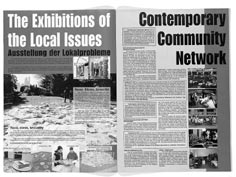 I deal with
the printed media in order to generate a suspicion, a discussion with
the public, i.e. to remind them that everybody could be his or her own
editor and publisher.
I deal with
the printed media in order to generate a suspicion, a discussion with
the public, i.e. to remind them that everybody could be his or her own
editor and publisher.
Due to the investments into her own home printing house during the 1920's,
Virginia Woolf became known as one of the first uncensored writers of
the new age. Merely fifty years later anyone who had access to a photocopying
machine could become a publisher. The Internet approach has multiplied
the right of voice, and turned users at home into publishers and distributors.
However, we are still waiting for the freedom of information.
The notion of hyper-information unavoidably reminds us of the systematic
worthlessness. Nothing is as passé as yesterday's newspaper. The
remnant can not only be understood as ecological waste, but also as a
political defeat. Many publishers are ashamed of their stocks. In my work
I often use the remnant as a mistake in the ideology, a mistake that can
be hushed. I also appreciate that a printing error can be a means of expression.
Race, Class, Sexuality
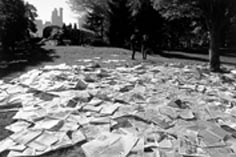 Since 1994 I have exhibited piles consisting of thousands of daily and
weekly newspapers in different contexts. I have introduced various parallel
readings and meanings, in which the starting point of all local problems
is set by the issue of race, class and sexuality. The newspapers can show
its affinities to illustration, drawing, photography or text. This is
always performed in the form of a concentrated comment, because we live
in a period when 'Everything has to be short and entertaining'. In its
basis the newspaper is an attitude towards a chosen theme (the issue of
local and global, private and public, information and misinformation,
urban neurosis and utopia…). Mostly this is an issue of the two poles.
The themes I deal with discuss the everyday life. Therefore, I find it
important to expose the newspapers to a broader audience, to place them
outside of the foreseeable, elitist, and often limited cultural spaces.
Most newspapers are printed in between 2 000 and 10 000 copies. Sometimes
I make the supplements for an existing newspaper. In 1996 the Austrian
Kleine Zeitung published the supplement 'Paradise' (marking the Austrian
triennial on photography) in 230 000 copies and within the organisation
of the Museum in Progress the Austrian Der Standard published the supplement
'Frenetic' in the year 2000.
Since 1994 I have exhibited piles consisting of thousands of daily and
weekly newspapers in different contexts. I have introduced various parallel
readings and meanings, in which the starting point of all local problems
is set by the issue of race, class and sexuality. The newspapers can show
its affinities to illustration, drawing, photography or text. This is
always performed in the form of a concentrated comment, because we live
in a period when 'Everything has to be short and entertaining'. In its
basis the newspaper is an attitude towards a chosen theme (the issue of
local and global, private and public, information and misinformation,
urban neurosis and utopia…). Mostly this is an issue of the two poles.
The themes I deal with discuss the everyday life. Therefore, I find it
important to expose the newspapers to a broader audience, to place them
outside of the foreseeable, elitist, and often limited cultural spaces.
Most newspapers are printed in between 2 000 and 10 000 copies. Sometimes
I make the supplements for an existing newspaper. In 1996 the Austrian
Kleine Zeitung published the supplement 'Paradise' (marking the Austrian
triennial on photography) in 230 000 copies and within the organisation
of the Museum in Progress the Austrian Der Standard published the supplement
'Frenetic' in the year 2000.
In the newspaper Local-Global, issued for Manifesta 1 in Rotterdam in
1996, I published my text by the same title. This text posed the basic
question of public activity performed by the individual in his only two
public roles that remain at his disposal: the activist role and the atavist
role. For the same exhibition I packed newspapers in variously coloured
plastic bags in the following cliché categories of consumer psychology:
newspapers for women, business people, athletes, etc., i.e. papers that
we buy without knowing the contents. We pay for them first and only then
do we see what we have purchased.
In 1996, I weighed a newspaper from Tuscany, wrapped it in transparent
film and marked it with a label that specified the political content and
the quantity of truth in grams. In this work, entitled 'Truth' I was searching
for the definition of truth and the answer to the question how many versions
of truth are there out there? Since information is interpretation, the
newspaper packed according to its weight in grams discloses that the truth
is also an interpretation.
The artist moves within a few given frames and formats. Beside the space,
time and physical frame, there is also the bureaucratic one. Most public
spaces are not accessible. In 1997 I installed 'The Exhibition of the
Local Newspaper' in Central Park, New York. It took me three months to
obtain all of the permits necessary to set up my work. This is why I call
this piece the bureaucratic one.
In 2001, Casino Luxembourg organised an action, for which I published
an invitation in the local newspaper for the citizens to collect newspapers.
When I gathered the newspapers I put them in a cage, and a year later
I closed a satellite dish in the cage.
I exhibit in public spaces, artistic and non-artistic, in the streets
and parks. I openly invite the public to actively participate by stomping,
altering information, creating their own, personal news and establishing
a critical relationship towards anything that is taken for granted. My
relationship with the public is collaborative. The public is never placed
in front of a completed action, instead it is free to participate and
redefine. The information is thus weighed, packaged, transformed and treated
in accordance with certain cultural canons, stereotypes and sexual prejudices.
I always give away or send as mail art any newspapers that I produce.
Community Art
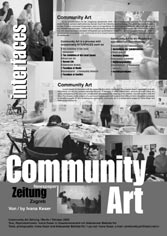 In the work entitled 'Indoctrination', in which the public completed the
started work (2000-2002: Zagreb, Belgrade, Moscow, Skopje), I have performed
an inversion of the conventional contribution by the public. Indoctrination
is a workshop without a leader. It consists of various remnants and a few
of my initial messages that can be found hanging on the wall. It is left
to the expressive freedom of the public and is free of any censorship. It
is the public that articulates the work. By using the cutting and gluing
technique; i.e. the same technique as is popularly believed to be used for
anonymous threatening letters it leaves political, poetical or ironical
traces and remarks - depending on the context. In short, the wall is used
so the visitors can leave unsigned thoughts that can not be openly expressed
in public. My relationship with the public is co-operative; i.e. the public
is the one that does the work. Indoctrination is a product of a period in
which one searches for the missing words. My personal reason for the entire
indoctrination situation was the diplomatic saying 'Words must be arranged
in a way so they do not hurt anybody.' This is a saying that is often repeated
within my works.
In the work entitled 'Indoctrination', in which the public completed the
started work (2000-2002: Zagreb, Belgrade, Moscow, Skopje), I have performed
an inversion of the conventional contribution by the public. Indoctrination
is a workshop without a leader. It consists of various remnants and a few
of my initial messages that can be found hanging on the wall. It is left
to the expressive freedom of the public and is free of any censorship. It
is the public that articulates the work. By using the cutting and gluing
technique; i.e. the same technique as is popularly believed to be used for
anonymous threatening letters it leaves political, poetical or ironical
traces and remarks - depending on the context. In short, the wall is used
so the visitors can leave unsigned thoughts that can not be openly expressed
in public. My relationship with the public is co-operative; i.e. the public
is the one that does the work. Indoctrination is a product of a period in
which one searches for the missing words. My personal reason for the entire
indoctrination situation was the diplomatic saying 'Words must be arranged
in a way so they do not hurt anybody.' This is a saying that is often repeated
within my works.
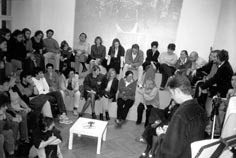
My public interventions and newspaper publishing are both founded in the confrontation of opinions and an active dialogue. I call the works based on the collaboration with the public, i.e. works in which the process does not necessarily end with the product - Community Art. As an idea Community Art originates from the time I collaborated with Aleksandar Battista Ili. Our collaboration was based on our common recognition of art as a dialogue. A dialogue, or rather collaboration reminds us that in truth, the public is the one who produces the meaning of an artefact. Community Art is also the title of a broader public project, which is in fact a permanent collaboration with experts from various interest spheres, all of whom are connected to socially engaged art.
News
The message 'Do not believe everything you see or hear' is eternal. People
like to come up with notions and constructions. I have always been interested
in systems: regardless of whether they are natural or artificial. Systems
of value, the probability system, the power system, etc. While the centres
of power are always dealing with the same strategies of regulated exploitation
within all fields, it is evident that the events are repeating themselves,
only the dates and the names of people and places change.
I entitled one of my newspapers that dates back to 1995, 2.500 typographic
dots. This newspaper was not really a newspaper, but a poster that consisted
of the capital letter 'A' and it obtained such a title because this was
the actual size of the monumental letter. For numerous democracies this
is still the most read newspaper. It starts with the first letter of the
alphabet, and there is a great chance it also ends with it.
The ownership of what I would like to call the news-tailoring factor (some
would say censoring factor) depends on the centre of power. The word news
is a linguistic, utopian trick in which every letter denotes one side of
the sky (n-orth, e-ast, w-est, s-outh). The news was supposed to extend
the notion of the message, but instead of coming ever closer to the message,
it was more and more reminiscent to the notion of the messy-age. The centres
of power have a monopoly on misinformation, thus (in the age of proclaimed
equality, freedom and democracy) the issue as regards the freedom of misinformation
is under question.
Obsessions and Frustrations
All my life I have been taught to be afraid of something, it does not
really matter what, as long as I am afraid. This insight is entangled
with the unpleasant feeling of constant limitation and control of my personal
freedom. The intention of my work (in which I deal with obsessions and
frustrations) is to stimulate the participants to recognise certain fragments
of their identity. Hyper-information has created a psychosis that is manifested
in the constant search of identity. By exposing my obsessions I also discuss
the obsessions, fears and frustrations of other people, because these
chronic conditions are contagious in urban surroundings. If I once again
refer to my text Local-Global from 1996, art is nothing else but a planetary
dimension with global consequences, or to be more precise the sum of all
local frustrations. The inflation is present in all spheres of life.
The countless pieces of news, information, tips and instructions represent
a conglomerate of the useful, useless, sensible and insensible. All of
this is entangled with the everyday life that is impossible to control
to the last detail. Information without selection means weariness of material.
The escape from this material means a constant simulation of the illusion
of absence. The escape into absence often means addiction. When we talk
about 'addiction', we usually think in terms of chemical addiction. Of
course, not all addictions are chemical. We will constantly repeat any
behaviour that leads to a pleasurable experience, especially if this behaviour
requires only a little bit of effort. The signs of addiction can be found
all around us.
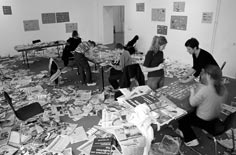
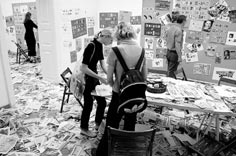
I summarise addictions (regardless whether they are mine or somebody else's),
onto the bare facts: I summarise the behaviour onto the common denominators.
I call the bottle with the universal medication for achieving a permanent
condition of euphoria and meditation, a collective identity and loyalty
to the projection of the future somewhere between hysteria and utopia, Stimulant
and Relaxant. Today, stress is an essential feature of status and success.
A number of people suffer from the fear that they are not sufficiently stressed.
The rule is simple: If you are in demand, then you must be successful, thus
anyone who is not under stress must be a loser. Most urban people worry
about having nothing to worry about, and if you are not busy, you are not
interesting. Thus, stress could also be a matter of prestige. Besides being
under constant stress it is also desirable to possess weaknesses. The weakness
is a sign that the indoctrination and manipulation were effective.
First all of all take a look around you. Perhaps a walking advertisement
will pass you by. Advertising is propaganda. Advertisements emerge from
economic, i.e. political interests. Today we can summarise the behaviour
of people into a couple of stereotypes. Can you count how many advertisements
you see or hear in a single day? Think of the radio, TV, the newspapers,
magazines, catalogues and billboards. Somebody is always trying to change
your life. In the same way as everything else the psychology of advertisements
and slogans is experiencing an evolution. However, this evolution does not
necessarily also mean progress. At the beginning consumer societies were
based on the idea of psychological expertise in order to reach a general
welfare, and not on the manipulation of people in order to achieve economic
gains.
Throughout my entire life I have been studying tips and instructions on
how to live. I have also dealt with this issue in my work Salle d'indoctrination
(Umag, 1997). The Salle was a room just like any other room inspired by
the advanced, refined, historical European courts, in which one can find
blue, white or golden saloons and boudoirs. With its content the Salle d'indoctrination
was freed from the ideological prejudices. It is seductively pink, cheerful,
vulgar, consumable, insatiable, full of weaknesses and dictation of time.
It discusses the syndrome of uniformity as a way of thinking. As any true
propaganda, it applies the recipe of manipulation and misinformation, a
mixture of harmlessness and entertainment. In order to get better acquainted
with oneself, everybody should make his own room for indoctrination. This
is because when we expose the things that we collect, we realise that the
things that we own actually possess us. I prepared a newspaper entitled
Nothing Personal for the Salle d'indoctrination, however, everything that
could be found in this newspaper was in fact very personal.
On Words and Images
Language, images, messages or the illusion of the absence of the message
are all things that we obtain from the outside world. I translate newspapers
into as many languages as possible, just so they would become local. I
often repeat messages if I can find a reason for this. The message: 'Everything
has to be short and entertaining' has emerged from the slogans 'Boredom
is luxury' and 'Future is luxury'. In my work I often adopt tautologies
as a form of communication, because I consider that this is today the
only way one can become noticed. Most commonly I publish my newspapers
in Croatian, German, French, Spanish, as well as in English, for I understand
English as a sort of Esperanto, which is not strictly bound to the official
version of the language. Instead, I perceive it as a language that is
constantly under development. While I am already speaking about slogans,
I would like to emphasise that (just like anybody else with a desire to
communicate) I often lean on the local rules of communication. My newspaper
has one general message: 'If you do not like the news go out and make
your own'. Anybody who is afraid to speak what is on his or her mind can
relax and adopt the slogan of the silent majority: 'Luckily, there are
rules of good behaviour'.
I often hear people who say that there are too many things in the newspaper
and that nobody knows what to believe anymore. This is frightening, because
the same people end up not being interested in any information at all.
In such cases it might be useful to use the ether therapy. It is strange
that TV sets have a switch that enables one to turn off the sound, but
not the picture.
In 2001 I wrote a thirty-minute radio play that was broadcast as a part
of the regular Croatian radio program. It consisted of a dialogue between
three persons: a moderator and two futurologists of confronting conceptions
as regards the future of the world. One was an advocate of ufology and
the other one defended society planning. The title of the radio play was
'The future is luxury' and it emerged as a part of the broader media project
entitled Broadcasting in Zagreb.
Radio has a certain magic that is possessed by no other media, i.e. the
importance of silence. Radio is not only a medium in which the illiterate
can actively co-operate in the role of a broadcaster or listener, it also
has no picture, which makes it far less polluting for the ether.
Information is Interpretation
In the work Polluted Water from 1998 I discussed the freedom of interpretation. The work consisted of 50 barrels filled with water. Each barrel contained one newspaper (domestic or international) that was freely floating in the water. As the show lasted for one month, the newspaper started to disintegrate, the water almost evaporated and what was left over looked like a dirty, stinking pool. The work provoked protests, especially from journalists. After they found their own articles in the newspapers, they started to look around for a political message in a general political environment of increased paranoia.
Value and Waste
Anyone who deals with quality and value inevitable faces the extreme, i.e. the question of waste. In the contemporary world the quantity and quality of waste is a proof of the level of civilisation. While the impossibility of choice in the consumer materialistic world creates poverty, and abundance creates wealth, waste indicates the level of wealth of prejudices, or maybe to be more precise 'progress'. I often say that my newspapers are my personal contribution to the civilisation of waste. The good thing about newspapers is that in comparison to other waste, they can eventually be recycled. Because the disclosure of social values is painful, waste is a political issue. We do not all have the same idea of values. The values of one man can be the waste of another. The value of a war hero in one nation presents a war criminal for another nation. It is said that information is the greatest capital, however, in the case of the newspaper, what was yesterday considered to be information is today's waste.
On Utopia
In 1991, when I completed my studies, one of my lecturers (a painter)
watched my video works that dealt with the relation of the individual
and information and then asked me: And where is the poetry in all this?
This question might belong to the 19th Century, but then again it might
not. If one equates poetry with nature he will notice that the things
we regard as 'natural' (even if it is actually about 'nature') are always
modified by various forms of human interests, i.e. institutional, ideological,
military, governmental or corporate.
It is impossible to control the proportions of natural and artificial.
Extremes generate extremes. I have spent years at the factory of official
newspapers on workdays, writing articles or designing the 'real' newspaper,
in order to spend the same years on Sundays, walking to the top of a hill
with Aleksandar Battista Ilic and Tomislav Gotovac. The Weekend Art project
consisted of hundreds of slides, always with the same protagonists, always
on the same hill. In the context of the surroundings our Sunday trips
to the hill presented a therapy through nature, as well as a form of resistance.
During my fine art studies (I studied painting) at the end of the eighties,
I considered a computer to be on the very top of the hierarchy of possible
abstractions. At the same time, I have always treated all media in the
context of art, merely as media, i.e. an intermediary between the artist
and the general public. Even today I would not single out a specific media
to have any advantage over the rest. I think that communication in the
future will not completely turn towards digital, this will merely be one
of the types of possible communication. The invention of the telephone
did not make letters disappear. The television did not kill the radio.
Computers did not create a world without paper. The cyberspace is to a
great extent similar to the real space that creates it. The fact that
numerous individuals or groups, specialised for issues such as minorities
or woman rights, can set up their own web sites does not change the power
relations in real space. Whatever is written in a newspaper or on the
Internet is read, but the true power of that story begins when it arrives
on television. Personally, I do not believe in ends such as: the end of
a book, printed matter, art, or civilisation. The senses of smell, taste,
touch, human contact or sex, will always be analogue parts of our lives.
About Politics
When I talk about nature I often emphasise that it is governed by the
law of the streets.
How many people would dare to state: 'My private and public thoughts are
the same'. I am against politics that barge into all spheres of our lives,
but I know that if I do not deal with them, politics will deal with me.
Finally, the only thing that I am interested in is the issue of privacy,
and as is already widely known, privacy is always also political.
In the world of information we see only what we want. It is the hardest
to see the indescribable, unconscious, non-literary, i.e. anything that
strikes us immediately after we open our eyes. Our perception discloses
how the world in which we live in has shaped us as an individual, professional
and political being.
While the centres of power distract our attention with democracy, equality
and the freedom of speech, all I really want is my political right to
misinformation.